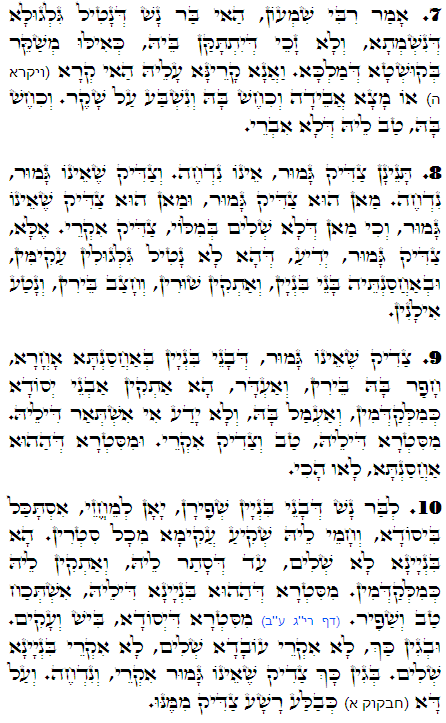Daily Zohar # 2182 – Pinchas – Make your life count
Previously published as DZ 1072
Daily Zohar Pinchas 1072

Hebrew translation:
8. שָׁנִינוּ, צַדִּיק גָּמוּר אֵינוֹ נִדְחֶה, וְצַדִּיק שֶׁאֵינוֹ גָמוֹר נִדְחֶה. מִיהוּ צַדִּיק גָּמוּר וּמִיהוּ צַדִּיק שֶׁאֵינוֹ גָמוּר? וְכִי מִי שֶׁלֹּא שָׁלֵם בִּדְבָרָיו נִקְרָא צַדִּיק? אֶלָּא צַדִּיק גָּמוּר, יָדוּעַ שֶׁהֲרֵי לֹא לוֹקֵחַ גִּלְגּוּלִים עֲקֻמִּים, וּבִירֻשָּׁתוֹ בּוֹנֶה בִּנְיָן, וּמַתְקִין חוֹמוֹת, וְחוֹצֵב בּוֹרוֹת וְנוֹטֵעַ אִילָנוֹת.
9. צַדִּיק שֶׁאֵינוֹ גָמוֹר בּוֹנֶה בִּנְיָן בִּירֻשָּׁה אַחֶרֶת, חוֹפֵר בָּהּ בּוֹרוֹת וְעוֹדֵר, הֲרֵי הִתְקִין אַבְנֵי יְסוֹד כְּמוֹ מִקֹּדֶם וְעָמֵל בָּהּ, וְלא יוֹדֵעַ אִם נִשְׁאָר שֶׁלּוֹ. מִצִּדּוֹ הוּא נִקְרָא טוֹב וְצַדִּיק, וּמִצַּד אוֹתָהּ יְרֻשָּׁה לֹא כָּךְ.
לְאָדָם שֶׁבּוֹנֶה בִּנְיָן יָפֶה, נָאֶה לְמַרְאֶה, הִסְתַּכֵּל בַּיְסוֹד וְרָאָה אוֹתוֹ שׁוֹקֵעַ עָקֹם מִכָּל הַצְּדָדִים. הֲרֵי הַבִּנְיָן לֹא שָׁלֵם עַד שֶׁסּוֹתֵר אוֹתוֹ וּמַתְקִין אוֹתוֹ כְּמִקֹּדֶם. מִצַּד אוֹתוֹ בִּנְיָן שֶׁלּוֹ נִמְצָא טוֹב וְיָפֶה – מִצַּד הַיְסוֹד רַע וְעָקֹם, וְלָכֵן לֹא נִקְרָא מַעֲשֶׂה שָׁלֵם, לֹא נִקְרָא בִּנְיָן שָׁלֵם. בִּגְלַל כָּךְ נִקְרָא צַדִּיק שֶׁאֵינוֹ גָמוּר, וְנִדְחֶה. וְעַל זֶה (חבקוק א) כְּבַלַּע רָשָׁע צַדִּיק מִמֶּנּוּ.
10. בֹּא וּרְאֵה, מִי שֶׁמְּקַנֵּא לַשֵּׁם הַקָּדוֹשׁ שֶׁל הַקָּדוֹשׁ בָּרוּךְ הוּא, שֶׁאֲפִלּוּ לֹא יִזְכֶּה לִגְדֻלָּה וְלֹא יִהְיֶה רָאוּי לָהּ, (שֶׁיּוֹרֵשׁ אוֹתָהּ) יַרְוִיחַ אוֹתָהּ וְיִקַּח אוֹתָהּ. פִּנְחָס לֹא הָיָה רָאוּי לָהּ בְּאוֹתוֹ זְמַן, וּמִשּׁוּם שֶׁקִּנֵּא לְשֵׁם רִבּוֹנוֹ הִרְוִיחַ אֶת הַכֹּל, וְעָלָה לַכֹּל וְהִתְתַּקֵּן בּוֹ הַכֹּל, וְזָכָה לְהִשְׁתַּמֵּשׁ בִּכְהֻנָּה עֶלְיוֹנָה. מֵאוֹתָהּ שָׁעָה – פִּינְחָס בֶּן אֶלְעָזָר בֶּן אַהֲרֹן הַכֹּהֵן, שֶׁהִשְׁלִים לִשְׁתֵּי דְרָגוֹת מִשּׁוּם שֶׁקִּנֵּא לְשֵׁם רִבּוֹנוֹ, שֶׁתִּקֵּן מַה שֶּׁהִתְעַקֵּם.
Pinchas 7-10
Rabbi Shimon quotes the following verse and explains that the ‘lost’ item is part of a person’s soul that is connected to his Tikkun process.
Leviticus 5:22
“אוֹ-מָצָא אֲבֵדָה וְכִחֶשׁ בָּהּ, וְנִשְׁבַּע עַל-שָׁקֶר; עַל-אַחַת, מִכֹּל אֲשֶׁר-יַעֲשֶׂה הָאָדָם–לַחֲטֹא בָהֵנָּה”
“or have found that which was lost, and denied it, and swear to a lie; in any of all these that a man does he sinned therein;”
If a person reincarnates to make a correction and doesn’t follow it, then it’s like lying about the existence of God. It would’ve been better for him if he was never born.
The Zohar here, defines two types of righteous people. One is a ‘complete’ righteous that comes in reincarnation but in a corrected state. His mission in life is to help and teach others in order to elevate his pure soul to a higher level. The other type is a ‘not completed’ righteous. It is a person that reincarnated more than once. He may acts as a righteous person but he still has more corrections to complete.
All the actions of the complete righteous is like building new buildings on his property. The one that did not complete his Tikkun, builds on a property that he doesn’t know if it is going to be his.
In the process of reincarnation a soul could be formed from one or more soul parts. One could come with a soul that includes parts that are in need of correction. They could be from another person in the family line who passed away before he was born.
A complete righteous has protection from evil people but the other righteous type should be careful when dealing with wicked and evil people. They are in a vulnerable state and could be consumed by the negative side.
Habakkuk 1:13
“טְהוֹר עֵינַיִם מֵרְאוֹת רָע, וְהַבִּיט אֶל-עָמָל לֹא תוּכָל: לָמָּה תַבִּיט, בּוֹגְדִים–תַּחֲרִישׁ, בְּבַלַּע רָשָׁע צַדִּיק מִמֶּנּוּ ”
“Your eyes are too pure to look on evil; you cannot tolerate wrongdoing. Why then do you tolerate the treacherous? Why are you silent while the wicked swallow up those more righteous than themselves?”
During our Tikkun process we should be careful about what we see with our eyes because we may fall into the illusion and do something wrong. Every action should be with positive purpose and always with the truth. By following this advice of Habakkuk, we can be saved from negativity that can swallow our light and all that we corrected before.
{||}

 Previous: Pinchas
Previous: Pinchas
